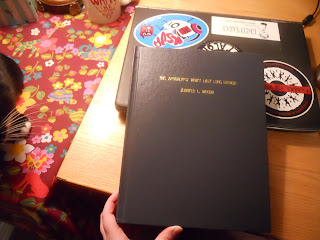Once I defended my thesis, the graduation process was far from over.
I was elated to be done with the oral defense of my thesis. It was a wonderful experience, and one that prepared me for future job interviews. But the saga of the thesis copies had yet to begin.
As a graduate student, your thesis becomes part of your university's legacy. The library, your department, and often your advisor will want a bound copy of your thesis. You may say, "that's nice, I bet I could just whip up a cost-effective copy through a print on demand service." But no! Alas, the path through this final requirement is much thornier.
In order to graduate, you have to organize the printing and binding of your thesis. The format must be approved by the Graduate School, and must include strange formatting like 1.5" left margins. The student is responsible for printing four copies of the thesis on 100% cotton paper, and then the university library organizes the binding of each copy.
To make a long story short, I will say that organizing the printing and delivery of your thesis from the other side of the country is a fate I do not wish upon you. If you find yourself in such a situation, I hope you are as lucky as I was and have an amazing department mastermind on your side like Leah Aronow-Brown.
Once my printed, unbound copies arrived at the graduate school it marked the last hurdle needed to confer my degree.
Now I had to wait.
The binding process takes a long time. Usually, they will not arrive until several months after your graduation date. I graduated in the summer, and I received my bound thesis copies yesterday, in late November.
I wasn't sure what the bound copies would look like. I'd never seen one in person. So I began daydreaming about green cloth covers with gold embossed letters, artisan embellishments in the interior cover.
But the thesis copy is more of an academic document, bound to be shelved in a library archive. It is still lovely, but in a more sterile way.
 |
| The cover is black but looks kind of plum in a certain light |
 |
| Shadow in a rare still photograph |
 |
This thing is thick - a solid 1 1/2 inches.
The page total is right at 150. |
 |
The side is printed with my last name at the top
and the bottom has the date of graduation, August 2012. |
 |
| Woot! |
Still, it's pretty cool to see my name stamped into a book cover.
As a general warning: thesis copies are expensive. Paying for them was a joint graduation present from my mother and father. Some of the copies are mandatory, like one for the library and one for your department. You cannot graduate until those copies are paid for and arranged.
But you also have the option of ordering additional copies. My family members wanted copies, so we ordered several. I wish I had made a separate version of my thesis for my family and a few friends, either through a print on demand site or as a xeroxed and hand-crafted zine. I could have designed a lovely cover for it no problem, and would have made sure to include an Acknowledgements page (which in the rush and stress of my thesis defense I forgot to include in the university version).
I'm submitting several of my thesis stories to journals, both literary and genre, so I don't want to put them up on amazon as a collection at the moment. But a private copy for family would not be considered publication.
I think I might go ahead and see if I can make a few copies of my thesis this way. There are still family members who won't get a library bound copy, and friends and advisors I'd like to thank for their help during my MFA years. Mark Pantoja's Kickstarter short story collection was beautiful, and sits proudly on my shelf. I'd like to have something lovely to give to my friends as well.
But I think it is also oddly fitting that my thesis,
This Apocalypse Won't Last Long Enough, looks like a book that would survive the apocalypse and might be found in a government stronghold that a few straggling survivors use as a way station.










